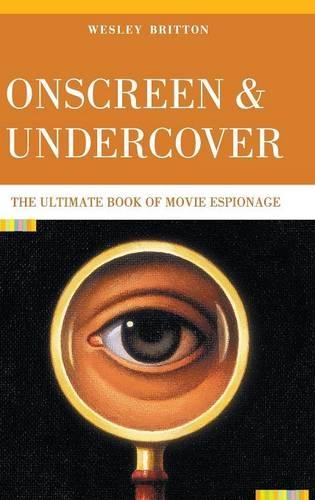
Onscreen and Undercover: The Ultimate Book of Movie Espionage
(Hardback)
Publishing Details
Onscreen and Undercover: The Ultimate Book of Movie Espionage
By (Author) Wesley Britton
Bloomsbury Publishing PLC
Praeger Publishers Inc
30th October 2006
United States
Classifications
General
Non Fiction
Films, cinema
791.4375
Physical Properties
Hardback
232
Width 156mm, Height 235mm
510g
Description
Wes Britton's Spy Television (2004) was an overview of espionage on the small screen from 1951 to 2002. His Beyond Bond: Spies in Fiction and Film (2004) wove spy literature, movies, radio, comics, and other popular media together with what the public knew about actual espionage to show the interrelationships between genres and approaches in the past century. Onscreen and Undercover, the last book in Britton's Spy Trilogy, provides a history of spies on the large screen, with an emphasis on the stories these films present. Since the days of the silent documentary short, spying has been a staple of the movie business. It has been the subject of thrillers, melodramas, political films, romances, and endless parodies as well. But despite the developing mistrust of the spy as a figure of hope and good works, the variable relationship between real spying and screen spying over the past 100 years sheds light on how we live, what we fear, who we admire, and what we want our cultureand our worldto become. Onscreen and Undercover describes now forgotten trends, traces surprising themes, and spotlights the major contributions of directors, actors, and other American and English artists. The focus is on movies, on and off camera. In a 1989 National Public Radio interview, famed author John Le Carre said a spy must be entertaining. Spies have to interest potential sources, and be able to draw people in to succeed in recruiting informants. In that spirit, Wes Britton now offers Onscreen and Undercover.
Reviews
How well did The Manchurian Candidate describe the fears of the early 1960s Who remembers that Buster Keaton's classic The General was actually a spy yarn Enthusiast Britton starts his hunt from the silent film and treads to the films that are likely to come our way soon, looking at the former as a form of Victorian melodrama with a rather scattered system of villains and fears and the latter as what the viewing public assumes about terrorists. Along the way he examines early civil war flicks and oaters, the aristocratic and elegant espionage of the 1930s, various narratives of nazis from the 1930s to 2005, the Bond, et. al. worship of the 1960s and 1970s, and the antiheroes from then to now. A fascinating chapter details how those who made movies somehow found spies of World War II and the Cold War hilarious. * Reference & Research Book News *
Author Bio
Wesley Britton is the author of Spy Television (Praeger 2004), the first book-length study of espionage television series, and Beyond Bond (Praeger 2005), a similarly groundbreaking treatment of spies in fiction and film. He is also the author of many articles for journals, encyclopedias, and periodicals, as well as of book reviews and poetry.
